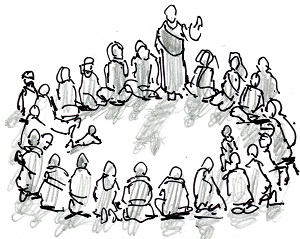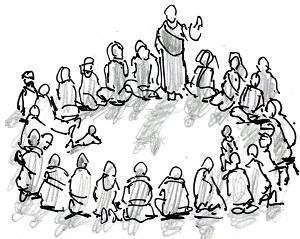

“Owe nothing to anyone, except to love one another” (Rom 13:8-10).
Twenty-Third Sunday of the Year
Ezek 33:7-9; Ps 95; Rom 13:8-10; Matt 18:15-20
One of the most difficult challenges for the early church was how to practice Jesus’ commandment to love unconditionally and at the same time protect the community from insiders who were threatening its survival. Jesus himself showed radical love in selecting the full range of human defects in his closest disciples, including a leader who would deny him and a traitor who handed him over to death. He accepted and absorbed into his small community men who were rivalrous, quarrelsome, stubborn, boastful, cowardly and skeptical of his goals. He never dismissed anyone, but patiently tolerated their failures even when they failed him in his hour of need.
A generation later, the first faith communities were struggling with this ideal but had devised ways to exclude troublemakers. Today’s Gospel describes in detail the steps in a process of excommunication in which an offender is confronted by one witness, then several, and finally the church itself before expulsion. Jesus’ radical standard for forgiveness—seven times seventy—had become three strikes and you’re out.
The dilemma of saving an individual member or protecting the community continued in the history of the church, sometimes conceding civil criteria for capitol crimes warranting execution—counterfeiting, murder, attacks on the crown, betraying the nation and, during the middle ages, heresy. The fragmenting of the church into separate denominations continues to defy the vision Jesus prayed for at the Last Supper: “May they all be one, Father, as we are one” (John 17:21).
We all know the impulse to create homogeneity to feel more secure. Too much diversity threatens our natural comfort zones, enclaves based on race, class, culture, income, education, political affiliation and religion. Yet, the challenge never goes away. Matthew quotes Jesus saying that outliers should be treated like tax collectors and pagans, people he welcomed and ate with, did miracles for. Even when his chosen Apostles scattered, Jesus went to the cross for everyone, “that they all may be one.” Unity in diversity continues to be the one goal that can create the Beloved Community.
Like all crises, our political season is bringing out the best and the worst in us. Ideologies take hold and dialogue is difficult. Tribal loyalties and siloed viewpoints make intellectual and emotional common ground rare. When Jesus promised to be present wherever two or three gathered, he knew how hard it was to get two or three people to agree on anything. He still dreamed of such “little churches” as the best approximation on earth of the Trinity in heaven.
Imagine a world in which the only thing we owed one another was our love. If this were the ground rule for all our relationships, our conversations, our politics and religion, how much progress we could make toward that “more perfect union” we the people promised in the preamble to the Constitution?
Advertisement







